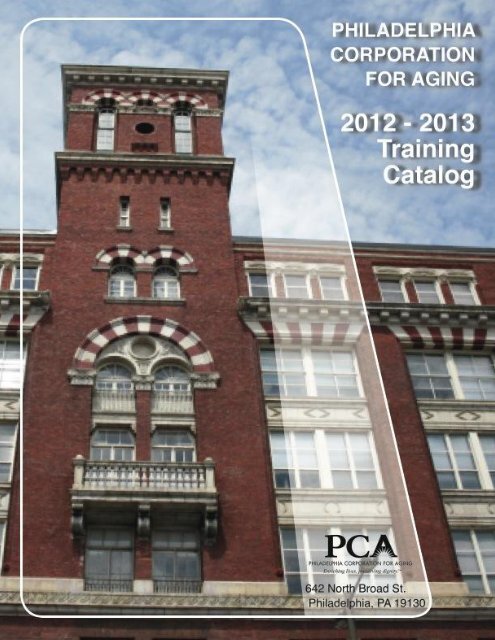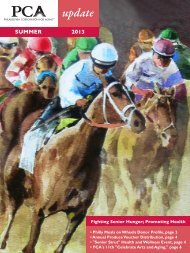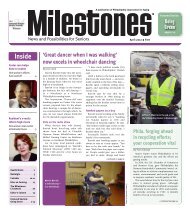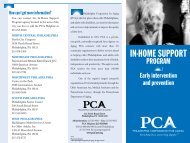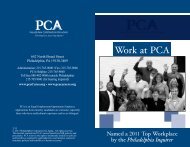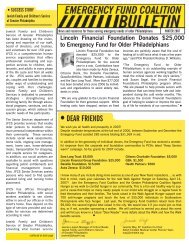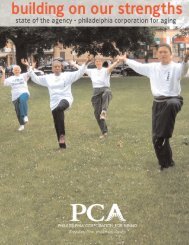Details - Philadelphia Corporation For Aging
Details - Philadelphia Corporation For Aging
Details - Philadelphia Corporation For Aging
You also want an ePaper? Increase the reach of your titles
YUMPU automatically turns print PDFs into web optimized ePapers that Google loves.
Microsoft Excel - Beginning ................................................................................................................................. 26Microsoft Excel - Intermediate ............................................................................................................................. 27Organization Skills for the Overwhelmed ............................................................................................................ 28Our Assumptions about Older People................................................................................................................... 29P.A.C.E. Training.................................................................................................................................................. 30Pennsylvania Property Tax-Rent Rebate Program ............................................................................................... 31Strengthening Your People Skills in the Workplace ............................................................................................ 32Survival Skills for Supervisors ............................................................................................................................. 33Working Effectively With Consumers in Difficult Situations .............................................................................. 36____________________________________________________________________________________________________________APPLICATION PROCESSTo apply to attend any program, please complete the registration information at the bottom of the page of eachprogram you wish to attend, and send them to PCA's Training Department. PCA staff should use inter-office mail,while aging network staff may either mail or fax their applications. While you may apply for a program at anytime throughout the year, it is recommended that you get your applications in before August 31, 2012. All sessionshave class size limits, and will be filled as applications are received. You will receive a confirmation if you havebeen scheduled for a program and a wait-list notification if the session is full. If someone cancels a session, the nextperson on the wait-list will be notified of the opening.In the event of inclement weather during the term, PCA determines whether training will be held in accordancewith the <strong>Philadelphia</strong> School District’s decision to close or remain open. If public and parochial schools are closed,PCA will cancel trainings for that day. Please check with KYW (1060AM), should we have inclement weather.Should you be unable to attend a session for which you have been confirmed, you have two options. If it a one day,stand alone program (not part of a series) you may substitute someone from your agency. Please call 215-765-9000,x 5065 and leave the following information:Title of training program, the person scheduled to attend and the person who will be taking their place.If you cannot attend a confirmed session, and have no substitute, please call 215-765-9000, x 5065 and leave a yourname and the name of the session that you must cancel. Please call as soon as you know you cannot attend. Manysessions have wait lists, and we can substitute another person if we have enough notice.Contact Information:Tom Shea – Manager of Training & Staff Development 215-765-9000 ext. 5065<strong>Philadelphia</strong> <strong>Corporation</strong> for <strong>Aging</strong>215-765-9066 Fax642 N. Broad Street tshea@pcaphl.org<strong>Philadelphia</strong>, PA 191303
CPR with Automated External Defibrillator TrainingCPR WITH AEDThis is a full day, comprehensive program that teaches the basic steps of Adult CPR combined with the use ofan automated external defibrillator (AED). This program is designed for laypersons who may need torespond to a cardiac emergency.It includes instruction on barrier devices as well as recognizing and responding to the four most commonmedical emergencies:Choking Heart Attack Stroke Cardiac ArrestTrainer: Christine Minczak, well known to past PCA registrants, will provide the scheduled trainings. Chris isa state-certified Emergency Medical Technician with almost 20 years of experience in CPR instruction,including training instructors.DATES & TIMES:Tuesday, September 11, 2012 Tuesday, March 5, 2013Tuesday, December 11, 2012 Tuesday, June 18, 2013All sessions will run from 9:30 AM – 12:45 PM.Class size is limited for this half-day workshop. Sessions will be filled on a first come, first served basis.Please identify your first and second choice below.__________________________________________________________________________________________________To register:Please complete the registration by printing clearly on the lines below and fax/ mail toTom Shea, PCA Planning Department at (215) 765-9066 by Friday, August 31, 2012.1st Choice: _____________________2nd Choice: ____________________________________________________________________________________________________________NameJob Title_______________________________________________________________________________________Agency/ Work Address (include zip code)_______________________________________________________________________________________Tel # Fax # E-mail Address________________________________________________________________________________________Signature of Registrant*Supervisor’s Approval5
CPR with AED for Healthcare ProvidersCPR WITH AED FORHEALTHCARE PROVIDERSThis is a comprehensive program that teaches the basic steps of Adult CPR combined with the use of an automatedexternal defibrillator (AED). It includes instruction on barrier devices as well as recognizing and responding to the fourmost common medical emergencies: CHOKING; HEART ATTACK; STROKE AND CARDIAC ARREST. Thisprogram is designed for non-healthcare providers who may need to respond to a cardiac emergency.PLEASE NOTE: These classes are specifically for nurses and other healthcare providers who have specific licenserenewal needs that require this program.Trainer: Christine Minczak, well known to past PCA registrants, will provide the scheduled trainings. Chris is a statecertifiedEmergency Medical Technician with almost 20 years of experience in CPR instruction, including traininginstructors.DATES & TIMES:Tuesday, November 27, 2012 Tuesday, March 26, 2013Tuesday, January 29, 2013 Tuesday, May 21, 2013All sessions will run from 9:30 AM – 2:00 PM, with a 15 min. breakClass size is limited for this half-day workshop. Sessions will be filled on a first come, first served basis.Please identify your first and second choice (dates & times) below.__________________________________________________________________________________________________To register:Please complete the registration by printing clearly on the lines below and fax/ mail toTom Shea, PCA Planning Department at (215) 765-9066 by Friday, August 31, 2012.1st Choice: _____________________2nd Choice: ____________________________________________________________________________________________________________NameJob Title_______________________________________________________________________________________Agency/ Work Address (include zip code)_______________________________________________________________________________________Tel # Fax # E-mail Address________________________________________________________________________________________Signature of Registrant*Supervisor’s Approval6
First Aid TrainingFIRST AID TRAININGA half-day basic introduction to first aid techniques will be presented which will equip participants to treat minor injuriesas well as provide life-saving assistance in a wide variety of emergency situations. Participants will learn how to respondto bleeding, burns, fractures, diabetic crises, drug overdoses, heat exhaustion, frostbite, poisonings, electrical shock andother threatening problems. Those certified will be capable of maintaining a person who has sustained serious medicalinjury until emergency assistance arrives.The course is certified by Coyne First Aid, Inc., an OSHA-approved training program. First Aid certification lasts forthree years. The course will include instruction and ample opportunity for application and practice. In light of the latteractivity, participants are encouraged to dress comfortably.Trainer: Christine Minczak, an experienced instructor of emergency techniques, will provide the training. Chris is wellknown to the local aging network through the emergency technique instruction she regularly presents at PCA.DATES & TIMES:Wednesday, November 7, 2012 Wednesday, April 24, 2013Wednesday, February 20, 2013 Wednesday, June 19, 2013All sessions will run from 9:30 AM – 12:45 PM.Class sizes limited to 12 participants for this half-day workshop.Please identify your first and second choice on the registration application.__________________________________________________________________________________________________To register:Please complete the registration by printing clearly on the lines below and fax/ mail toTom Shea, PCA Planning Department at (215) 765-9066 by Friday, August 31, 2012.1 st Choice___________________ 2 nd Choice___________________________________________________________________________________________________________NameJob Title_______________________________________________________________________________________Agency/ Work Address (include zip code)_______________________________________________________________________________________Tel # Fax # E-mail Address________________________________________________________________________________________Signature of Registrant*Supervisor’s Approval7
Foundations in GerontologyFOUNDATIONS IN GERONTOLOGYTHE PHYSICAL, SOCIAL ANDPSYCHOLOGICAL REALITIES OF AGING:This series will provide participants much more than a basic introduction to the field! Participants will gainknowledge and sensitivity about the realities of late life, which will enhance their ability to understand, interactand relate more effectively with older consumers. In short, this series will prepare staff in aging serviceagencies to serve older consumers responsively and effectively. This series is recommended for anyone whoworks directly or indirectly with older consumers. This program is particularly helpful for people new to thefield of aging or the aging services network!Participants are required to attend the full series – six (6) half-day sessions.Unit 1: Psychological Changes with <strong>Aging</strong> – Sessions 1 & 2Dr. Maureen Gibney, PsyD, Neuropsychologist & Trainer;Faculty – Drexel University, Department of PsychologyUnit 2: Social Changes with <strong>Aging</strong> – Sessions 3 & 4Nancy Morrow, MSW, Trainer/Consultant,Faculty - UPENN School of Social WorkUnit 3: Physical Changes with <strong>Aging</strong> – Sessions 5 & 6Mary Anne Sheehan, RN, Director of L.I.F.E., St. AgnesDATES & TIMES:#1 - Thursday, November 1, 2012 9:00 AM - Noon #4 - Tuesday, November 27, 2012 9:00 AM - Noon#2 - Thursday, November 8, 2012 9:00 AM - Noon #5 - Wednesday, December 5, 2012 9:00 AM - Noon#3 - Tuesday, November 13, 2012 9:00 AM - Noon #6 - Wednesday, December 12, 2012 9:00 AM - Noon__________________________________________________________________________________________________To register:Please complete the registration by printing clearly on the lines below and fax/ mail toTom Shea, PCA Planning Department at (215) 765-9066 by Friday, August 31, 2012._______________________________________________________________________________________NameJob Title_______________________________________________________________________________________Agency/ Work Address (include zip code)_______________________________________________________________________________________Tel # Fax # E-mail Address________________________________________________________________________________________Signature of Registrant*Supervisor’s Approval8
How to Better Serve African and Caribbean Senior ConsumersHOW TO BETTER SERVE AFRICAN andCARIBBEAN SENIOR CONSUMERSThis training is designed to provide direct service workers and program supervisors with knowledge andinsights on how to better serve <strong>Philadelphia</strong>’s growing African and Caribbean senior populationsOverview of African and Caribbean Cultures, to include–Participation limited to 35What is the Family Structure?What are the local practices, spiritual beliefs and primary social practices/issues?What are some of the Culture Factors Influencing the Daily Lives of African andCaribbean peoples in the US?What are Common Myths?What are some differences between Africans and African Americans?How can providers meet the needs of the Caribbean and African communities?Case StudiesDate and Time:Wednesday, March 27, 20131:30 PM - 4:30 PMPCA - Auditorium WestTrainers: BRB Consulting__________________________________________________________________________________________________To register:Please complete the registration by printing clearly on the lines below and fax/ mail toTom Shea, PCA Planning Department at (215) 765-9066 by Friday, August 31, 2012._______________________________________________________________________________________NameJob Title_______________________________________________________________________________________Agency/ Work Address (include zip code)_______________________________________________________________________________________Tel # Fax # E-mail Address________________________________________________________________________________________Signature of Registrant*Supervisor’s Approval9
How to Handle Conflict and ConfrontationHOW TO HANDLE CONFLICT & CONFRONTATION: KEYS TOMANAGING, RESOLVING & WORKING THROUGHDISAGREEMENTSIf you don’t handle confrontation well, or at all, chances are that you could be paying a heavy price at the expense of yourcareer success and your personal happiness. After attending How to Handle Conflict & Confrontation, you’ll discoverhow to get to the real cause of the problem… how to disarm disagreeable people … how to defuse tense situations…howto handle anger (yours and others).After this seminar, you’ll be able to:Overcome the fear of confrontation and conflictMaster an easy, three-step method of conflict resolutionRespond coolly, confidently and tactfully in even the most heated and emotional situationsStand up for yourself and assert your personality in a professional waySay good-by to the stress, anger and frustration that unresolved conflict has caused youHere’s what you’ll learn:Understanding conflict – and why it makes us so uncomfortableMastering calm confrontation: a professional approach that will improve your resultsEffectively managing your anger – and that of othersEffective communication: your key to minimizing conflict and resolving disagreementsDATE & TIME:Thursday, January 10 th , 20139:00 AM – 4:00 PMThis one-day workshop includes an hour break for lunch.Please list your preferred date on the Registration Application.__________________________________________________________________________________________________To register:Please complete the registration by printing clearly on the lines below and fax/ mail toTom Shea, PCA Planning Department at (215) 765-9066 by Friday, August 31, 2012.Preferred Date: ____________________________________________________________________________________________________________NameJob Title_______________________________________________________________________________________Agency/ Work Address (include zip code)_______________________________________________________________________________________Tel # Fax # E-mail Address________________________________________________________________________________________Signature of Registrant*Supervisor’s Approval12
Interaction Management® Essentials of LeadershipINDIVIDUAL MODULE DESCRIPTIONS__________________________________________________________________________________________Essentials of LeadershipThe essence of being an effective people leader lies in establishing good interpersonal work relationshipsand having the ability to spark action in others.This foundation course for all Interaction Management ® courses teaches leaders how to get results throughpeople. During this course, you will attain the tools necessary for a successful leadership journey. Learnersacquire a set of proven interaction skills, discover seven Leadership Imperatives key to meeting today’schallenges, and realize their role as a catalyst leader who inspires others to act.This module helps leaders:• Multiple their effectiveness by motivating their teams and helping people to be more effective.• Accomplish more in interactions in less time while enhancing interpersonal relationships.• Help people enhance their performance by providing them with feedback they are willing to accept andupon which they are able to act.During this ½ day interactive workshop, participants will:• Discuss the challenge of leadership today; the role of the leader as catalyst; and the Seven LeadershipImperatives – critical skills for a successful leader to possess.• Become familiar with the Interaction Process and Key Principles to ensure the success of everyinteraction.• Learn the Interaction Guidelines and Process Skills they will need to meet the practical needs of thepeople they lead – and a planning tool to guide the discussion.• Become skilled in Feedback Essentials and discover that feedback can be a powerful motivator forpeople – and a model for consistent, effective feedback.• Develop a plan to incorporate these new skills into their leadership practices.16
Setting Performance ExpectationsInteraction Management® Setting Performance ExpectationsAchieving business results requires aligning a staff member’s goals with overall agency goals. Leadersmust help people see how their efforts contribute to the success – or failure – of the agency.This course helps leaders drive performance and accountability by helping people understand what is expectedof them and gaining their commitment to achieving it. When leaders conduct effective setting expectationsdiscussions, people feel more motivated to perform because they see how their efforts make a difference.This module helps leaders:• Ensure mutual understanding of performance expectations.• Help others identify performance expectations that align with the agency’s goals.• Gain individual or team commitment to fulfilling expectations in the performance plan.• Handle challenging situations that can arise during setting expectations discussions.During this half (½) day interactive workshop, participants will:• Learn the purpose and process of setting expectations discussions – achieving understanding, alignmentand agreement.• Learn to create and communicate SMART objectives – that follow the SMART model.• Use the Discussion Planner tool to plan setting expectations discussions that incorporate the InteractionGuidelines and Key Principles.• Use the STAR & STAR/AR models to structure consistent, understandable and actionable feedback.• Develop solutions to deal with the challenging situations identified earlier in the session.• Develop a plan to incorporate these new skills into their leadership practices.17
Interaction Management® Reviewing Performance ProgressReviewing Performance ProgressWhen it comes to executing agency strategies, driving performance is critical. When leaders are able toeffectively review progress toward achieving agreed-upon expectations, they strengthen the performanceof the individual, the work group, and the agency.This course helps leaders drive performance and accountability by replacing the “dread” of performancereviews with the “human touch” that builds trusting relationships with the people who report to them. Leaderslearn to conduct effective discussions that recognize people’s success and plan for future development.This module helps leaders:• Use progress reviews as a business tool in guiding individuals, work groups, and the agency towardsuccess.• Encourage people to sustain good performance and improve less-than-desirable results.• Build people’s responsibility in monitoring, collecting, and analyzing performance data.• Handle challenging situations that can arise during progress review discussions.During this half (½) day interactive workshop, participants will:• Understand the performance cycle, and identify WIIFMs – positive outcomes for the individual and theagency if progress reviews are done well.• Understand the pitfalls that stop constructive progress reviews and learn tips to avoid these pitfalls.• Learn the importance of ongoing tracking and interim progress reviews – and learn tips for data andfeedback collection.• Learn the process for preparing for an end-of-cycle review, including how to help individuals preparefor their review.• Use a discussion planner to analyze a video model of a leader conducting a progress review discussion.• Prepare for an upcoming real-time performance review using the tools and techniques during thesession.18
Interaction Management® Coaching for ImprovementCoaching for ImprovementIndividuals need to take responsibility for addressing unacceptable performance or work habits thatimpact others and the organization – but leaders must know how to help them do it.This course helps leaders conduct effective improvement discussions and provide the feedback and ongoingsupport people need to improve performance.This module helps leaders:• Encourage others to take charge of improving performance and altering work habits, develop animprovement plan, and measure their progress.• Prepare for and conduct successful improvement discussions.• Handle specific challenges that might occur during such discussions.• Foster morale and productivity by addressing performance and work habit issues in a firm, fair andconsistent manner.During this half (½) day interactive workshop, participants will:• Explore the challenges of an improvement discussion from both the leader’s and employee’sperspective.• Review the coaching process relative to a performance improvement situation.• Identify effective and ineffective approaches to coaching for improvement.• Analyze a positive model of a performance improvement discussion and provide feedback on theleader’s skills.• Prepare for and conduct an improvement discussion using the Interaction Process.• Discuss the importance of ongoing coaching – observation, measurement, feedback and support – in animprovement situation.• Using the STAR format, practice providing feedback with specific performance measures.19
Interaction Management® Coaching for SuccessCoaching for SuccessAlthough sometimes unavoidable, there is an alternative to coaching for improvement. Rather than onlycorrecting mistakes after they happen, we can coach staff to perform tasks correctly from the beginning!This course develops leaders who help people achieve goals and avoid problems – a positive experience forthemselves and those being coached. Leaders learn a proven coaching process to ensure they identify coachingopportunities, provide needed coaching and support, observe performance, and measure results until desiredoutcomes are achieved.This module helps leaders:• Prepare people to successfully handle challenging situations and tasks.• Expand their team’s capabilities by being able to give them more opportunities to learn new skills.• Delegate new responsibilities with confidence.• Spend less time reacting to problems because they have prepared their work group to succeed.During this half (½) day interactive workshop, participants will:• Explore the three types of coaching – for success, improvement, and to manage performance problems.• Identify the benefits of coaching for success, identify opportunities to proactively coach members oftheir work group, and learn the coaching process.• Learn the importance of balancing “seeking” and “telling” in the coaching process – and how toincorporate the Interaction Process model.• Practice using the Discussion Planner to prepare for and conduct a coaching for success discussion.• Understand the importance of observation and measurement in identifying ongoing coaching needs.• Discuss the importance of providing feedback and using the STAR format.20
Interaction Management® Resolving ConflictResolving ConflictDifferences of opinion can quickly escalate into an out-and-out battle. In the workplace, it’s the leader’srole to recognize the signs of conflict and then quickly choose the appropriate level of involvement to helpresolve the issue.This course teaches leaders how to recognize that a conflict is escalating and minimize damage by using themost appropriate resolution tactic – regardless of which stage a conflict is in. Leaders also learn the true cost ofconflict to an organization and techniques for handling even the most challenging conflict-related discussionseffectively.This module helps leaders:• Effectively resolve workplace conflict and enhance productivity, efficiency, and morale.• Help others take responsibility for resolving workplace conflicts.• Reduce the negative effects of workplace conflict on individuals, groups, and the organization.During this half (½) day interactive workshop, participants will:• View a video illustrating the escalation of a conflict, identify behavioral signs of escalation and learnabout the stages of conflict.• Discuss obvious and hidden costs of conflict in the workplace.• Identify situations where it is appropriate to use one of the four resolution tactics.• Use a Discussion Planner to analyze a positive model video of a leader using the coaching tactic to helpsomeone resolve his own conflict.• Watch a video meeting focusing on people’s emotions and behaviors and discuss ways to defuse strongemotions and balance the discussion.• Participate in practice sessions to gain skill in using the coaching and mediate resolution tactics.21
Interaction Management® Leading ChangeLeading ChangeIn today’s fast-paced, global business environment, external forces – technology, the economy,regulations, funding cuts – are forcing organizations to change their business practices to continue tofunction. Their ability to “shift gears” and minimize the impact of change is key to ensuring theycontinue to serve customers and consumers effectively.This course focuses on the leader’s role in effectively leading change initiatives in the workplace. Leaders learnhow to introduce a change initiative and lead discussions with staff to explore how best to implement thechanges. They also learn how to help others overcome their resistance to change. These skills enhance aleader’s ability to minimize the potentially negative effects of change on morale, processes and productivity.This module helps leaders:• Understand the importance of commitment to and ownership of change for themselves and others.• Effectively introduce change, explore change, and overcome people’s resistance to change.• Minimize the negative impact, on individuals, work groups, and the agency, of not adapting to change.• Sustain an environment that embraces change and celebrates successes.During this ½ day interactive workshop, participants will:• Participate in an activity that reveals how leaders feel when they are introducing change and thedisorientation others experience in response to change.• Discuss external forces that drive change and the business strategies or needs that are driving changes intheir work groups.• Learn the three phases of change – disorientation, reorientation and integration.• Discuss three types of change discussions – introducing change, exploring change, and overcomingresistance to change.• Watch a video and analyze a model of a leader introducing and exploring change, and provide feedbackon the leader’s skills.• Prepare and practice a discussion to introduce and explore their own change situation22
Interaction Management® Motivating OthersMotivating OthersMotivation is closely correlated to staff productivity and retention. In large part, it’s up to the leader tospark this high level of sustained energy and peak performance in people.In this course leaders learn how to proactively create an environment in which people are highly motivated toperform. Participants learn the three factors that effect the motivation of staff – focused work, interpersonalsupport, and individual value. As a result of this course, they will be able to determine which factors are “low,”and emerge with both a plan of specific actions and the skills needed to build group and individual motivation.This module helps leaders:• Create an environment that allows individuals and work groups to achieve their full potential.• Sparks high levels of sustained energy in individuals and work groups.• Improve work group results by helping people sustain their motivation.During this ½ day interactive workshop, participants will:• Define personal motivation by sharing a time when they were highly motivated at work – why they wereand actions they took that reflected their motivation.• Discuss the workshop definition of motivation and three approaches – instilling fear, offering incentives,and sparking high energy (the focus of this course).• Explore three factors that lead to sustained energy – focused work, interpersonal support, and individualvalue.• Learn to use the Motivating Others Action Planner by identifying best practices and planning actions toaddress the motivation issue presented in a video example.• Understand the challenges of addressing motivation factors with respect to individuals – includingpreferences and perceptions – by continuing the video case study.23
Life Balance and Stress ReductionLIFE BALANCE AND STRESS REDUCTIONAs the title implies, this full-day workshop is for anyone looking for tools to balance their work and personallives and reduce their stress levels. You will learn many tactics for identifying stressful situations and copingwith stress - in the office and at home.What you’ll learn:• The difference between good and bad stress; internal and external stress• To identify the physical symptoms of stress• Your personality type and communication style – and how that can impact stress levels and stress copingbehaviors• The differences between how men and women cope with stress• To define the connection between self-esteem and stress management• To define your daily stressors• To define the signs of burnout and how to overcome it• To create an action plan to simplify your life at work and at homeDATES & TIMES:Tuesday, December 4 th , 20129:00 AM – 4:00 PMThursday, April 11 th , 20139:00 AM – 4:00 PMThis one-day workshop includes an hour break for lunch.Please list your preferred date on the Registration Application.__________________________________________________________________________________________________To register:Please complete the registration by printing clearly on the lines below and fax/ mail toTom Shea, PCA Planning Department at (215) 765-9066 by Friday, August 31, 2012.Preferred Date: ____________________________________________________________________________________________________________NameJob Title_______________________________________________________________________________________Agency/ Work Address (include zip code)_______________________________________________________________________________________Tel # Fax # E-mail Address________________________________________________________________________________________Signature of Registrant*Supervisor’s Approval24
Microsoft Excel - AdvancedMICROSOFT EXCEL - ADVANCEDAs the title implies, this one-day workshop is for solid intermediate users who want to learn how to make the most ofExcel’s features and functions and push their skills to the next level and advanced users who are eager to learn additionalshortcuts and tips that will boost their speed and productivity in Excel.What you’ll learn:• How to multiply the amount of information your worksheets can hold with hyperlinks• The fastest-growing way to share your spreadsheets with others• Control functions most people don’t know they have or can use• Times when AutoFilter is a terrific tool – and times when it’s not• Simple shortcuts for creating Custom AutoFilters• Using macros to automate your worksheets• The 7 parts of the VB workspace and how to maximize your abilities with each• Everything you’ve ever wanted to know about Pivot Tables•DATE & TIME:Tuesday, April 2 nd , 20139:00 AM – 4:00 PMThis one-day workshop includes an hour break for lunch.__________________________________________________________________________________________________To register:Please complete the registration by printing clearly on the lines below and fax/ mail toTom Shea, PCA Planning Department at (215) 765-9066 by Friday, August 31, 2012._______________________________________________________________________________________NameJob Title_______________________________________________________________________________________Agency/ Work Address (include zip code)_______________________________________________________________________________________Tel # Fax # E-mail Address________________________________________________________________________________________Signature of Registrant*Supervisor’s Approval25
Microsoft Excel - BeginningMICROSOFT EXCEL - BEGINNINGAs the title implies, this one-day workshop is for anyone who wants or needs to know the basics about this powerful toolin the Microsoft Office Suite. This will truly acquaint you with the nuts and bolts of the program, and give you a firmfoundation to build upon as you become more familiar with Excel and how it can make many of your tasks easier.What you’ll learn:• How to use Excel worksheets to enter and select data• How to save data in worksheets• How to modify a worksheet• How to perform various mathematical calculations• How to format a worksheet• How to develop workbooks• How to print the contents of a workbook• How to customize the application window’s layout and much, much more…DATE & TIME:Tuesday, December 11 th , 20129:00 AM – 4:00 PMThis one-day workshop includes an hour break for lunch.__________________________________________________________________________________________________To register:Please complete the registration by printing clearly on the lines below and fax/ mail toTom Shea, PCA Planning Department at (215) 765-9066 by Friday, August 31, 2012._______________________________________________________________________________________NameJob Title_______________________________________________________________________________________Agency/ Work Address (include zip code)_______________________________________________________________________________________Tel # Fax # E-mail Address________________________________________________________________________________________Signature of Registrant*Supervisor’s Approval26
Microsoft Excel - IntermediateMICROSOFT EXCEL - INTERMEDIATEThis one-day workshop is for intermediate users who know the basics but want to learn how to make the most of Excel’sfeatures and functions and push their skills to the next level and users who are eager to learn additional shortcuts and tipsthat will boost their speed and productivity in Excel.What you’ll learn:• To use the VLOOKUP and HLOOKUP functions• Why an automatic update of linked worksheets makes your job easier• How to create a linking formula with step-by-step guidelines• Create interactive macros and pause your macro to allow for user input• The most common Excel printing goofs…and how to avoid them• How to perform a what-if analysis using the Scenario Manager• Two powerful reasons why you’ll leave this workshop a macro user• How to record a macro in your customized toolboxDATE & TIME:Tuesday, February 5 th , 20139:00 AM – 4:00 PMThis one-day workshop includes an hour break for lunch.__________________________________________________________________________________________________To register:Please complete the registration by printing clearly on the lines below and fax/ mail toTom Shea, PCA Planning Department at (215) 765-9066 by Friday, August 31, 2012._______________________________________________________________________________________NameJob Title_______________________________________________________________________________________Agency/ Work Address (include zip code)_______________________________________________________________________________________Tel # Fax # E-mail Address________________________________________________________________________________________Signature of Registrant*Supervisor’s Approval27
Organization Skills for the OverwhelmedORGANIZATION SKILLS for the OVERWHEMLEDIn the history of “work”, no one has ever been asked to do less with more. Quite the opposite, we are allstruggling to more, and more, and more … with less. There’s less time, less resources, even less people.Organization Skills for the Overwhelmed delivers practical tips, techniques and strategies for getting organizedand taking control – right away!Learn how to organize ANYTHING in 3 basic stepsEliminate time-wasters from your day and boost your productivityIdentify your peak productivity times of the day and use them most effectivelyDiscover how to pinpoint and eliminate old habits and behaviors that waste precious timeGain smart tips to make sure you always have papers and files at your fingertips – the moment you needthemLearn how to have a neat, efficient work area you’ll be proud for others to seeDiscover how to get control of your in-box, e-mail, voice-mail and other communicationsDATE & TIME:Tuesday, May 14 th , 20139:00 AM – 4:00 PMThis one-day workshop includes an hour break for lunch.__________________________________________________________________________________________________To register:Please complete the registration by printing clearly on the lines below and fax/ mail toTom Shea, PCA Planning Department at (215) 765-9066 by Friday, August 31, 2012._______________________________________________________________________________________NameJob Title_______________________________________________________________________________________Agency/ Work Address (include zip code)_______________________________________________________________________________________Tel # Fax # E-mail Address________________________________________________________________________________________Signature of Registrant*Supervisor’s Approval28
Our Assumptions about Older PeopleOUR ASSUMPTIONS ABOUT OLDER PEOPLEBetty Friedan in her book, The Fountain of Age, notes that since life expectancy is nearly 80, we nowcan expect to live 1/3 to 1/2 our life after raising a family. She asks why we are not looking at age as anew, evolving stage of life --- not as decline from youth.This one day training will offer participants the opportunity to examine both personal and societal conceptionsof aging in an exciting and experiential way. Unexamined assumptions can lead to erroneous conclusions aboutolder people in many arenas: their abilities, interests, physical well-being and mental health. Most of us are notfully aware of what we believe about aging yet what we believe shapes how we feel about, think of and relate toolder people. It also influences how we understand and experience our own aging.Drawing on her background in gerontology, creative drama and teaching, Dr. M. Kathryn Jedrziewski hasdesigned an engaging workshop which facilitates exploration of assumptions about older people. Through"hands-on" learning, role-plays, complex case studies, group discussions, and problem solving, Dr. Jedrziewskiwill help participants gain new appreciation of the potentials and complexity of aging as well as of the vitalityand diversity of older people.Trainer: Dr. M. Kathryn JedrziewskiDATES & TIMES:Thursday, December 6 th , 20129:00 AM – 4:00 PMThursday, April 18 th , 20139:00 AM – 4:00 PMThis one-day workshop includes an hour break for lunch.Please list your preferred date on the Registration Application.__________________________________________________________________________________________________To register:Please complete the registration by printing clearly on the lines below and fax/ mail toTom Shea, PCA Planning Department at (215) 765-9066 by Friday, August 31, 2012.Preferred Date: ____________________________________________________________________________________________________________NameJob Title_______________________________________________________________________________________Agency/ Work Address (include zip code)_______________________________________________________________________________________Tel # Fax # E-mail Address________________________________________________________________________________________Signature of Registrant*Supervisor’s Approval29
P.A.C.E. TrainingP.A.C.E. TRAINING(PHARMACEUTICAL ASSISTANCE CONTRACT FOR THE ELDERLY)This training is designed to familiarize direct service workers with the PACE and PACENET programs. It will also coverhow the PACE Program coordinates benefits with Medicare D.The training will highlight:• History and administration of the PACE Program, including important changes that• have greatly expanded the program!• Where to obtain applications, program eligibility criteria, and completing applications.• How to use the PACE card.• Identifying program barriers and strategies for overcoming them.• Coordinating benefits with Medicare Part D.Trainer: Darlene Shughart - Applications and Enrollments Manager, Pennsylvania Pharmaceutical Assistance Contractfor the Elderly (PACE Program). Darlene has been with PACE since 1985 and also serves as the program’s projectmanager on its integration with the Medicare prescription drug benefit.DATE & TIMEWednesday, May 22, 201310:00 AM – 12:30 PMPCA, Auditorium WestRegistration is limited to 30 participants per session, so enroll now!___________________________________________________________________________________________To register:Please complete the registration by printing clearly on the lines below and fax/ mail toTom Shea, PCA Planning Department at (215) 765-9066 by Friday, August 31, 2012._______________________________________________________________________________________NameJob Title_______________________________________________________________________________________Agency/ Work Address (include zip code)_______________________________________________________________________________________Tel # Fax # E-mail Address________________________________________________________________________________________Signature of Registrant*Supervisor’s Approval30
Pennsylvania Property Tax-Rent Rebate ProgramPENNSYLVANIA PROPERTY TAX/RENTREBATE PROGRAMThis training is designed to familiarize direct service workers with the PA Property Tax/Rent Rebate Program.Eligible elders, widows, widowers and the disabled may receive this benefit!The training will highlight:• History and administration of the Property Tax/Rent Rebate program, including important changes!• Where to obtain applications, program eligibility criteria, completing applications and providingdocumentation.• Identifying program barriers and strategies for overcoming them.• Advocacy and follow-up.Trainer: Rich Klimek, PCA Housing SupervisorDATE & TIMEWednesday, April 3, 20139:30AM – 12:30 PMPCA, Auditorium WestRegistration is limited to 30 participants per session, so enroll now!___________________________________________________________________________________________To register:Please complete the registration by printing clearly on the lines below and fax/ mail toTom Shea, PCA Planning Department at (215) 765-9066 by Friday, August 31, 2012._______________________________________________________________________________________NameJob Title_______________________________________________________________________________________Agency/ Work Address (include zip code)_______________________________________________________________________________________Tel # Fax # E-mail Address________________________________________________________________________________________Signature of Registrant*Supervisor’s Approval31
Strengthening Your People Skills in the WorkplaceStrengthening Your People Skills in the WorkplaceAttend this one-day workshop and gain essential skills for understanding, relating to and working better withall types of people…even the most difficult!This workshop will substantially improve your people skills, so you will:• Never again experience the misunderstandings and miscommunications that have soured workingrelationships in the past.• Feel confident in situations that once caused you stress and anxiety.• Work effectively with people whose personalities and communications styles differ from your own.• Make others feel valued, important and comfortable in your presence.• Improve your results in dealing with difficult people by better understanding them.• Break out of your comfort zone to feel more comfortable in unfamiliar settings and activities.• Deliver criticism in a constructive way that causes positive behavior change, not anger and resentment.• Resolve conflict and move on to collaboration and cooperation.DATE & TIMEThursday, March 7 th , 20139:00 AM – 4:00 PM___________________________________________________________________________________________To register:Please complete the registration by printing clearly on the lines below and fax/ mail toTom Shea, PCA Planning Department at (215) 765-9066 by Friday, August 31, 2012._______________________________________________________________________________________NameJob Title_______________________________________________________________________________________Agency/ Work Address (include zip code)_______________________________________________________________________________________Tel # Fax # E-mail Address________________________________________________________________________________________Signature of Registrant*Supervisor’s Approval32
Survival Skills for SupervisorsSURVIVAL SKILLS FOR SUPERVISORSThe following series of workshops in supervisory skills are required for newly hired or promoted PCAsupervisors. <strong>Aging</strong> Network Staff who supervise others are invited to enroll as well.The series is sequential, and you should plan to attend all sessions. All sessions are presented in half-daysegments, from 9:00 AM – Noon.o Organizational Survival: How Do I Fit? – Pt. 1 Thursday, January 17, 2013o Organizational Survival: How Do I Fit? – Pt. 2 Thursday, January 31, 2013o Personality Styles and Learning Styles – Pt. 1 Thursday, February 14, 2013o Personality Styles and Learning Styles – Pt. 2 Thursday, February 28, 2013o Growing a Resourceful Team – Pt. 1 Thursday, March 21, 2013o Growing a Resourceful Team – Pt. 2 Thursday, April 4, 2013o Meeting Management Thursday, May 9, 2013_______________________________________________________________________________________________________All programs are designed to help people with supervisory responsibility to:Understand the behavior of individuals in groups and organizations;Deepen their knowledge of the supervisory role and of their own strengths and challenges in masteringthat role;Learn practical theories that can be easily applied at the worksite;Practice skills needed in everyday interactions.Please see the pages that follow for details of each topic area.__________________________________________________________________________________________Trainer: Margie DuBrow holds her Ph D in organizational development from Temple University. She has 25years of experience as an administrator, organizational consultant and trainer in education and social serviceorganizations. She served as Director of Development at Center in the Park for over six years and as a trainerfor PCA for more than ten years. She is currently the Director of the Nonprofit Executive Leadership Institute(NELI) at Bryn Mawr College School of Social Work and Social Research.___________________________________________________________________________________________________________33
Organizational Survival: How Do I Fit?Every organization has its own set of rules, those that are formal and written and those that are informal andinvisible. Even though the formal rules are supposed to be the most important, we often learn that an invisibleor "unspoken" rule has high priority when we stumble across it by mistake.Learning to navigate these rules is an important part of supervisory survival. In this program, we will examinethe value systems and beliefs that helped form the roles in your organization and explore how they fit or conflictwith your own personal system.We will conduct a self assessment of our own leadership styles. We will analyze how our styles fit into ourorganization structures and cultures. We will also discuss the "rites of initiation" that take place, whether youare "brand new" as a supervisor or whether you are an experienced supervisor breaking into a new job._________________________________________________________________Personality and Learning Styles: Their Impact on Professional PerformanceEach person is born with unique talents and a way of perceiving the world. They help to form both ourpersonality patterns and our learning styles, which then influence our behaviors and the way we interact witheach other. Knowledge about these differences can help us better understand how and why we act as we do.In turn, that awareness provides us with the means to be more effective in many workplace behaviors, such ascommunication, planning, problem solving, and training. It becomes a powerful tool in coaching, conflictresolution, and in team building.We will analyze the strengths our styles give us - and the challenges they present in managing staff whose stylesdiffer from our own. We will discover how applying our knowledge will create more productive workrelationships, with our staff, our peers, and our supervisor.34
Growing a Resourceful TeamAward-winning gardens do not bloom overnight. Neither do winning teams. Helping your supervisees changefrom a group to a team is a slow process, involving careful cultivation, nurturing, and tending with care.Just like gardens, groups have life cycles. In this program, we will examine the five stages of groupdevelopment and diagnose the current growth stage of your own work group. We will discuss the challenges ofeach stage of growth for both the supervisor and the supervisees. We will diagnose the work group's skills incommunications, decision making, and performing as a team. We will conduct self-assessments to betterunderstand our own behaviors as team behaviors and how they can affect the health of the team.Finally, we will examine different leadership styles and their impact on group development. This will includethe need for clarity regarding authority and decision making for team members._________________________________________________________________Meeting ManagementMeetings: you can't live with them and you can't live without them!In this program, we will focus on the building blocks of strong meeting management:• Management of time and task• Setting clear goals and operating procedures• Prioritizing group work• Developing strong facilitation skills• Documenting key decisions, outcomes, and follow-up steps• Managing the behavior of difficult participants.The emphasis in this session will be on running an efficient, focused meeting.35
Working Effectively With Consumers in Difficult SituationsWORKING EFFECTIVELY WITH CONSUMERSIN DIFFICULT SITUATIONSHave you encountered a consumer who is so challenging that you've questioned why you entered the helpingprofessions? Despite provider empathy and good intentions, not all older persons are responsive in the serviceinteraction. This training will help participants identify, understand and respond more effectively to consumerswho exhibit difficult behaviors.In this series of three sessions, you will:a) Examine a variety of problematic behaviors encountered in older consumers: the resistant consumer,the angry consumer, the paranoid and passive consumer;b) Outline practical strategies for dealing with such behaviors and consider how these behaviors relateto important behavioral health diagnoses and conditions;c) Understand the implications of your personal style and issues in dealing with difficult consumerbehaviors.Participants will be encouraged to share from their case experience to facilitate discussion and provideopportunities for applying new information and trying out new approaches.Trainer: Nancy Morrow - an experienced trainer and clinician in the area of behavioral health and aging.Nancy draws on more than 20 years of experience in a variety of roles in community-based long term care andgeriatric behavioral health.DATES & TIMESSeries # 1 - February 12 th , 19 th & 26 th - 20139:00 AM – NoonSeries # 2 - May 15 th , 22 nd & 29 th - 20139:00 AM – Noon___________________________________________________________________________________________To register:Please complete the registration by printing clearly on the lines below and fax/ mail toTom Shea, PCA Planning Department at (215) 765-9066 by Friday, August 31, 2012.Please List Your Preferred Series: Series # _____________________________________________________________________________________________NameJob Title_______________________________________________________________________________________Agency/ Work Address (include zip code)_______________________________________________________________________________________Tel # Fax # E-mail Address________________________________________________________________________________________Signature of Registrant*Supervisor’s Approval36


